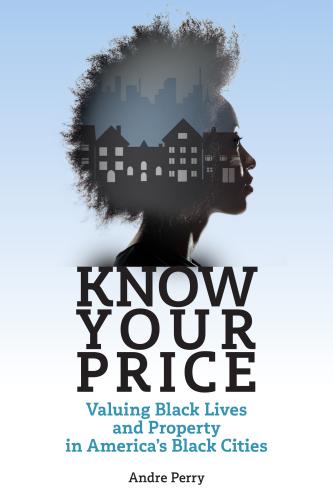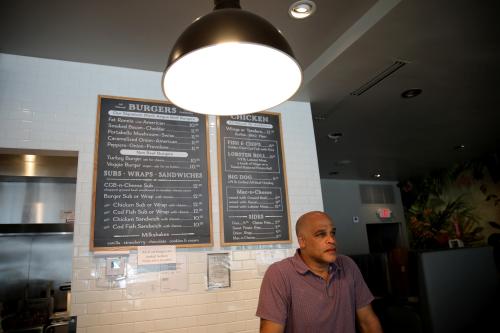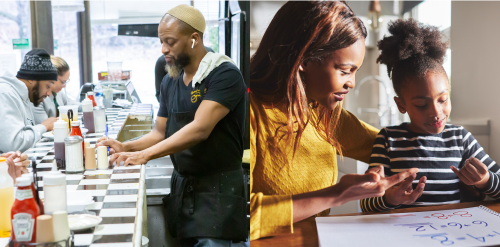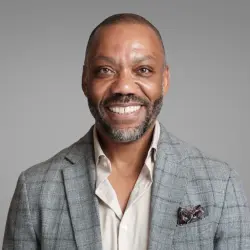This post was adapted from remarks by Andre M. Perry at a May 19 webinar for the launch of his new book, Know Your Price: Valuing Black Lives and Property in America’s Black Cities.
When talking about Black American families, we’ve all heard someone say this not-so-subtle dig: It all starts at home. The phrase suggests that if we could just fix Black mothers and fathers to be responsible like white, middle-class families, we wouldn’t have any problems.
False narratives such as this one help normalize a hierarchy of human value that leads to an investment into whiteness. Since the Moynihan Report was published in 1965, researchers and journalists have continued framing poverty mainly as a function of individual choices. The report offered a robust structural analysis, but it set a dangerous precedent by identifying Black people not living up to white middle-class ideals as a central problem. This falls in line with the white supremacist myth claiming that harsh conditions in many Black communities are the result of Black people’s collective choices and moral failings.
One of the major goals of my new book, Know Your Price: Valuing Black Lives and Property in America’s Black Cities, is to show that there is nothing wrong with Black people that ending racism can’t solve. Presumptions of Black people’s unworthiness undercut efforts to invest in Black-majority neighborhoods. There’s a whole lot of programs and research that attempt to fix Black people, and not enough focused on fixing structural racism. Until we rid ourselves of these underlying assumptions found between the lines of our research, policy recommendations, and reforms, we will always do more harm than good.
Know Your Price identifies how Black lives and property are devalued by racism. By exalting the assets and strengths that have been devalued, we can debunk the false narratives that distract us from investing in those assets. If we can account for the associated costs of racism to individuals, then we can begin to properly restore lost value by investing in the people who have been penalized simply for being Black.
The anchor study in Know Your Price found that after controlling for factors such as housing quality, education, and crime, owner-occupied homes in Black neighborhoods are devalued by $48,000 on average—amounting to a whopping $156 billion in cumulative losses. The value of homes in Black neighborhoods is much higher than they are priced. Isn’t this true in other parts of our lives?
That figure, $156 billion, could have been used to start over 4 million Black-owned businesses. Black entrepreneurs certainly could use the money, as they are denied bank loans more than twice as often as their white peers (and when they do get loans, they pay higher interest rates). The loss of equity means that many Black business owners are less likely to have the financial cushion to weather economic crises like the one we’re in now. During the Great Recession, about half of Black businesses survived, compared to 60% of white-owned firms.
The $156 billion lost on racism should have helped municipalities fund essential services such as education. For decades, we’ve known that school funding, wealth, and racial prejudice are correlated with academic achievement. Schools dominated by students of color received $23 billion less than majority-white districts; this is largely a byproduct of an educational system that devalues Black communities through a financing structure based on local property taxes.
Many education reformers ignore structural racism, saying that it’s too hard to address segregation and school financing systems. But when reform is applied within the confines of inequality in Black-majority cities, we leave little room but to effectively blame Black teachers, parents, and school boards for underachievement. I saw this up close as a charter school leader in New Orleans after Hurricane Katrina.
Approximately 10 years after the levees were breached, the share of Black teachers in New Orleans dropped from over 70% to about 50%. Replaced by a younger, mostly white teacher corps, two-thirds of the teachers who had worked in New Orleans before Katrina were no longer in the field.
The erasure of Black teachers flew in the face of research showing the positive effects of Black educators on academic success. Black students who have one Black teacher by third grade are 7% more likely to graduate high school and 13% more likely to enroll in college. After having two Black teachers, Black students’ likelihood of enrolling in college increases by 32%. Unfortunately, hiring more Black teachers is something we have yet to try at scale.
The values underlying the erasure of Black teachers are also behind why Black women can’t buy or educate their way toward better birthing outcomes, despite their educational and professional gains in the past few decades.
More Black babies die before their first birthday than all other racial categories. The mortality rate among Black mothers is three times higher than their white counterparts. These disparities exist even after controlling for education and income.
In a 2017 study using death records, my wife, Joia Crear-Perry, and her co-authors found that racial inequality in factors such as educational attainment, income, unemployment, and imprisonment showed harmful effects on Black infant mortality. When racial inequality in employment increased, Black infant mortality worsened. A decrease in educational inequality improved Black infant mortality.
The devaluation of Black lives is at the intersections of race, gender, and occupation. Our solutions, then, must be intersectional in nature.
The issue of birth equity, like all the other issues presented in Know Your Price, is not an academic one for me. In the book, I detail the very personal struggle that my wife—who is a physician—and I had in trying to have a child while she was going through a professional crisis. In the chapter “Having Babies Like White People,” I show that instead of restricting access to women’s fertility options—an idea that the Moynihan Report gave life to—we must expand Black women’s reproductive choices. The lack of wealth that the federal government facilitated should not continue to limit Black women’s choices.
Just as the U.S. government actively worked to normalize bigotry through policy, it can normalize investment in the people who have been denied wealth, dignity, and opportunity. Indeed, discrimination has serviced whiteness in public policy for so long that it has become an immoral entitlement, an iniquitous form of social security. We need an anti-racist policy agenda that normalizes support for the injured.
Over the next few months, I will roll out the Valuing Black Assets Initiative (VBAI). The initiative will employ a virtual book tour to help communities mobilize around their assets amid COVID-19 recovery efforts. Brookings’s Metropolitan Policy Program will also develop an index of target goals to advance Black businesses. We’re determined to increase employment among 15% of Black businesses at a rate which will add an estimated $55 billion to the U.S. economy. The “path to 15/55” will convene business leaders, government stakeholders, and communities, and provide them with the necessary steps to achieve this goal.
In addition, Brookings Metro and the social entrepreneurship organization Ashoka will solicit social entrepreneurs in cities across the country for a $1 million competition to develop policy- and market-based solutions that confront the problem of housing devaluation. The project will incentivize innovators who are proximate to the problem and will seek to foster structural changes that remove the drag of racism on home values.
Earlier this week was the birthday of Malcom X, who once said, “When a person places the proper value on freedom, there is nothing under the sun that he will not do to acquire that freedom.”
I wrote this book because I know my price. I look forward to working with those who know their price, too.
Andre Perry’s book, Know Your Price: Valuing Black Lives and Property in America’s Black Cities, is available wherever books are sold.








Commentary
A revolution of values for Black American families
May 22, 2020